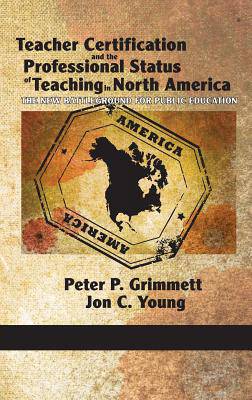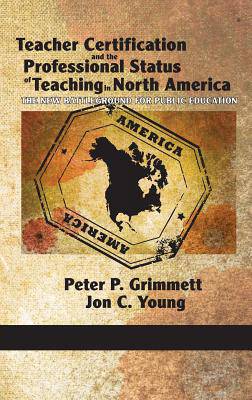
- Afhalen na 1 uur in een winkel met voorraad
- Gratis thuislevering in België vanaf € 30
- Ruim aanbod met 7 miljoen producten
- Afhalen na 1 uur in een winkel met voorraad
- Gratis thuislevering in België vanaf € 30
- Ruim aanbod met 7 miljoen producten
Teacher Certification and the Professional Status of Teaching in North America
The New Battleground for Public Education (Hc)
Peter P Grimmett, Jon C Young, Claude LessardOmschrijving
This book locates recent developments in teacher certification in North America within a broader, international policy context characterized as hegemonic neo-liberalism wherein economic rationalism has begun to trump professional judgment. We focus on teacher certification because it addresses fundamental questions about who will teach, what are the required minimum levels of competence, and who will make those decisions. Such questions are central to teaching, constituting a new battleground for education in North America.
Two ideas--economic rationalism and professionalization--have become pivotal to education policy. Economic rationalism finds its expression in a free market ideology. Professionalization has two meanings: professionalizing the practice of teaching (constructing a professional knowledge base); and professionalizing the status of teaching (through links with universities and self-regulation). These ideas' contestation varies by setting. In the USA, neo-liberalism has attacked professional knowledge, questioning its scientific veracity. Professionalization advocates claim that the neo-liberalist aim is to undermine teaching as a profession. In Canada, neo-liberalist critics are heard but have limited impact on policy. Professionalization has emphasized teachers' pedagogical development and a valuing of the field's input into teacher preparation.
Neo-liberalist economic rationalism plays itself out overtly in the USA as de-regulation; in Canada, it lies embedded within labor mobility agreements. In the USA, professionalization highlights professionalism in practice; in Canada, the governance of teaching. This book explores how economic rationalism is using labor mobility agreements in Canada as a covert operation analogous to de-regulation in the USA to assert its dominance in the battle to de-professionalize teaching in North America.
Specificaties
Betrokkenen
- Auteur(s):
- Uitgeverij:
Inhoud
- Aantal bladzijden:
- 236
- Taal:
- Engels
Eigenschappen
- Productcode (EAN):
- 9781617355769
- Verschijningsdatum:
- 16/11/2011
- Uitvoering:
- Hardcover
- Formaat:
- Genaaid
- Afmetingen:
- 156 mm x 234 mm
- Gewicht:
- 508 g

Alleen bij Standaard Boekhandel
Beoordelingen
We publiceren alleen reviews die voldoen aan de voorwaarden voor reviews. Bekijk onze voorwaarden voor reviews.











